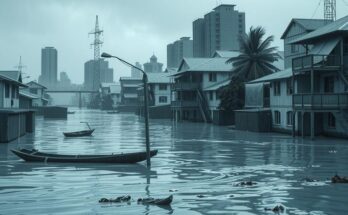The year 2024 witnessed a series of deadly natural disasters linked to climate change, claiming thousands of lives and causing significant financial losses globally. Notable incidents included Tropical Storm Trami in the Philippines, Hurricane Helene in the U.S., and Typhoon Yagi across Southeast Asia. The UN emphasized the need for increased funding to aid disaster prevention efforts in developing nations.
In 2024, the world witnessed a series of catastrophic natural disasters that resulted in extensive loss of life and significant damage, significantly exacerbated by ongoing climate change. The National Centers for Environmental Information reported that the United States alone experienced 24 major weather events with damages exceeding $1 billion. During the COP29 conference, UN officials acknowledged the need for increased long-term financing to assist developing nations in mitigating the impacts of these disasters, underscoring the dire need for improved disaster preparedness and response measures globally.
Among the tragic events of the year, Tropical Storm Trami claimed over 100 lives in the Philippines, particularly devastating parts of the northwestern region with heavy rainfall and landslides. In Chile, wildfires resulted in at least 136 fatalities, marking it as one of the deadliest in the country’s history. Nepal faced severe flooding and landslides following two days of heavy rain, leading to the deaths of at least 192 individuals, particularly impacting the densely populated Kathmandu Valley.
Japan experienced a New Year’s earthquake with a magnitude of 7.6, which resulted in over 213 lives lost and widespread destruction of homes. Following heavy rainfall in eastern Spain, floods resulted in more than 224 deaths, prompting public criticism regarding government disaster response strategies.
In the Southeastern United States, Hurricane Helene was particularly catastrophic, leading to at least 225 fatalities, primarily in North Carolina, and extensive property damage estimated at nearly $60 billion. Furthermore, landslides in Ethiopia claimed at least 250 lives, with subsequent landslides exacerbating the tragic toll.
Typhoon Yagi caused significant devastation across Southeast Asia, resulting in more than 500 deaths across multiple countries, including Vietnam, Myanmar, and the Philippines. In Papua New Guinea, a massive landslide resulted in at least 670 confirmed deaths, with many more feared trapped. Finally, a severe heat wave during the Hajj pilgrimage in Saudi Arabia led to the tragic loss of at least 1,300 lives, highlighting the risks faced by unregistered pilgrims in extreme heat conditions.
These events underscore the inescapable reality that climate-related disasters are increasingly lethal and deserve urgent attention and proactive strategies on a global scale.
Natural disasters have become increasingly frequent and deadly, heavily impacted by climate change. With more than 24 significant weather or climate events recorded in the U.S. alone in 2024, the effects of such disasters are not negligible, leading to unprecedented loss of life and financial costs. Experts agree that without significant intervention, including enhanced international support for vulnerable countries, the toll from future catastrophic events will likely worsen. The consequences of these disasters have been observed across the globe, from devastating hurricanes to severe flooding and landslides, demonstrating an urgent need for improved disaster preparedness and response.
In conclusion, the year 2024 revealed the catastrophic impact of natural disasters, which have resulted in substantial loss of life and destruction globally. Among the deadliest events were Tropical Storm Trami, Hurricane Helene, and Typhoon Yagi, each illustrating the pressing need for proactive climate strategies and disaster management. UN officials stress the importance of tripling funding to aid developing nations, yet significant challenges and responsibilities remain for all countries to prepare for the escalating threats posed by climate change. The continued rise in the frequency and severity of natural disasters calls for urgent collective action to mitigate future risks and protect vulnerable populations.
Original Source: www.usnews.com




